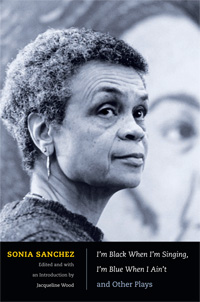Sonia Sanchez
The official website for the renowned writer, poet, playwright and activist.
I’m Black When I’m Singing, I’m Blue When I Ain’t and Other Plays
 $19.95 Paperback
$19.95 Paperback$69.95 Hardcover
Available from:
Amazon
Barnes and Noble
Independent Bookstore
How to Buy
This collection brings together for the first time the plays of Sonia Sanchez, a prolific, award-winning poet and one of the most prominent writers in the Black Arts movement. In addition to Sanchez’s five previously published plays The Bronx Is Next (1970), Dirty Hearts (1971), Sister Son/ji (1972), Malcolm/Man Don’t Live Here No Mo (1979) Uh, Uh; But How Do It Free Us? (1975), and , the collection also includes her two unpublished plays, I’m Black When I’m Singing, I’m Blue When I Ain’t (1982) and 2 x 2 (2009). It reveals the thematic and formal exchanges between Sanchez’s poetry and dramatic works over the course of four decades. Sanchez emerged as a black nationalist poet and playwright in the late 1960s and early 1970s. Like her poetry, her dramas reflect her critique of the racism and sexism that she encountered as a young female writer in the black militant community, her ongoing concern with the well-being of the black community, and her commitment to social justice. I’m Black When I’m Singing, I’m Blue When I Ain’t and Other Plays includes three essays in which Sanchez reflects on her art and activism, and an introduction by Jacqueline Wood situating Sanchez’s plays in relation to her poetry, activism, and the feminist dramatic voice in black revolutionary art.
“Sonia Sanchez remains one of the most read, respected, and visible figures of the Black Arts Movement, as well as its most significant female figure. This volume only adds to that legacy.”—Amiri Baraka
“These seven plays by Sonia Sanchez form an emotional and historic bridge from the loud revolutionary power of the 1960s and the twentieth century to the more insidious and subtle challenges of this first decade of the twenty-first. Their power lies in their ability to present super/real snapshots of their time and circumstance with the mystic clarity that mixing poetry and drama can create. From The Bronx Is Next, where Brothers prepare to burn down Harlem tenements, to 2 X 2, where Beverly and Ramona Smith find one another, Sonia’s persistent call to Blacks—and especially to women—is to find the strength to assemble our ghosts and demons, confront them, and lay them to rest. The plays are startling and open us to a Sonia Sanchez whose vision can see the world as stage, or, perhaps, stage as the world.”—Charles Fuller
“Poet Sonia Sanchez deserves a Nobel for her lyrical representation and advocacy of the universal black woman.”—Ed Bullins
“Whether I encounter Sonia in poetry, prose, or drama, I am always struck by the fearlessness of her intellect, the effortless musicality of her language, and her commitment to putting these gifts—always—in service of the Struggle. I rejoice for those who, through this book, will encounter Sonia for the first time.”—Ruby Dee